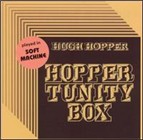Home » Jazz Articles » Album Review » Hugh Hopper: Hopper Tunity Box
Hugh Hopper: Hopper Tunity Box
This year there are two projects: Soft Machine Legacy, which reunites Hopper, Dean and Marshall with guitarist John Etheridge; and Soft Bounds, which teams Hopper and Dean with pianist Sophia Domancich and drummer Simon Goubert, both from France. A live Soft Bounds album is already out, with a live Soft Machine Legacy release due out later this year, and a studio recording sometime in '06.
As Soft Machine evolved over time and various players left the group, individual contributions became clearer. When Hopper departed after the release of Six, it was because the group had ceased to be interesting to him. With the recruitment of reed player/keyboardist Karl Jenkins—who would take on more compositional responsibilities as time progressed—Soft Machine's vision of jazz-rock shifted away from Hopper's. His '76 release Hopper Tunity Box, recently reissued and available through Hugh Hopper's website, goes a long way to clarifying just what went wrong and why Hopper left.
While Hopper shares a disposition towards riff-based composition with Jenkins, their individual complexions couldn't be more disparate. Contrasting with Jenkins' safer, pentatonic-based writing, Hopper retains a more jagged angularity. He also leans towards layering more abstruse melodies and greater freedom in soloing. With Dean, reed player Gary Windo, and cornetist Mark Charig on many tracks, pieces like the darkly funky title tune, a chaotically insistent reprise of "Miniluv from Hopper's debut album 1984, and the gentle modal swing of "The Lonely Sea and the Sky bear a kind of weight that is at once more overt, yet at the same time somehow subtler and less opportunistic than where Jenkins was going with Soft Machine.
Hopper delivers a stunningly brooding version of Ornette Coleman's "Lonely Woman —the only non-Hopper piece on the disc—with Dean, Windo, and Charig playing the familiar melody over Hopper's searching bass and electronics. "Gnat Prong, the longest piece on the album, and the denser "Mobile Mobile feature muscular solos by fellow Canterburian keyboardist Dave Stewart of Hatfield and the North/National Health fame over Hopper's constantly shifting harmonic backdrop, making one wonder why Stewart didn't get out more often.
Because of its chronological proximity to Soft Machine, Hopper Tunity Box demonstrates what was lost when he left, but more importantly it draws a clear line to future projects including his Franglo-Dutch band that would record Meccano Pelorus, as well as current projects like Soft Machine Legacy and the freer exchange of Soft Bounds.
Track Listing
Hopper Tunity Box; Miniluv; Gnat Prong; The Lonely Sea and the Sky; Crumble; Lonely Woman; Mobile Mobile; Spanish Knee; Oyster Perpetual.
Personnel
Hugh Hopper
bass, electricHugh Hopper: bass, guitar, recorder, soprano saxophone, percussion; Elton Dean: alto sax, saxello on 4,6,8; Mark Charig: cornet, tenor horn on 4,6,8; Frank Roberts: electric piano on 4,5,8; Dave Stewart: organ, pianet, oscillators on 1,3,7; Mike Travis: drums on 1-5,8; Richard Brunton: guitar on 2,5; Gary Windo: bass clarinet, saxophones on 1,2,5,6; Nigel Morris: drums on 7.
Album information
Title: Hopper Tunity Box | Year Released: 2005 | Record Label: Culture Press
< Previous
Live at the TCC!
Next >
Saloua
Comments
Tags
For the Love of Jazz
 All About Jazz has been a pillar of jazz since 1995, championing it as an art form and, more importantly, supporting the musicians who create it. Our enduring commitment has made "AAJ" one of the most culturally important websites of its kind, read by hundreds of thousands of fans, musicians and industry figures every month.
All About Jazz has been a pillar of jazz since 1995, championing it as an art form and, more importantly, supporting the musicians who create it. Our enduring commitment has made "AAJ" one of the most culturally important websites of its kind, read by hundreds of thousands of fans, musicians and industry figures every month.




















